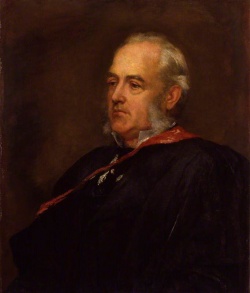Max Müller: Difference between revisions
No edit summary |
No edit summary |
||
| Line 1: | Line 1: | ||
[[File:Max Muller.jpg|right|250px|thumb|Friedrich Max-Müller]] | [[File:Max Muller.jpg|right|250px|thumb|Friedrich Max-Müller]] | ||
'''Friedrich Max Müller''' ([[December 6]], 1823 – [[October 28]], 1900), generally known as Max Müller, was a German-born philologist and Orientalist, who lived and studied in Britain for most of his life. He was one of the founders of the western academic field of Indian studies and the discipline of comparative religion. Müller wrote both scholarly and popular works on the subject of Indology. The Sacred Books of the East, a 50-volume set of English translations, was prepared under his direction. He also promoted the idea of a Turanian family of languages and Turanian people. | '''Friedrich Max Müller''' ([[December 6]], 1823 – [[October 28]], 1900), generally known as Max Müller, was a German-born philologist and Orientalist, who lived and studied in Britain for most of his life. He was one of the founders of the western academic field of Indian studies and the discipline of comparative religion. Müller wrote both scholarly and popular works on the subject of Indology. '''''The Sacred Books of the East''''', a 50-volume set of English translations, was prepared under his direction. He also promoted the idea of a Turanian family of languages and Turanian people. | ||
He was defeated in the 1860 election for the Boden Chair of Sanskrit to [[Monier Monier-Williams|Prof. Monier Williams]]. Müller was far better qualified for the post, but lacked practical first-hand knowledge of India. Also, both candidates had to emphasise their support for [[Christianity|Christian]] evangelisation in India, since that was the basis on which the Professorship had been funded by its founder. Müller's broad theological views cast doubts about his dedication to Christianisation. | He was defeated in the 1860 election for the Boden Chair of Sanskrit to [[Monier Monier-Williams|Prof. Monier Williams]]. Müller was far better qualified for the post, but lacked practical first-hand knowledge of India. Also, both candidates had to emphasise their support for [[Christianity|Christian]] evangelisation in India, since that was the basis on which the Professorship had been funded by its founder. Müller's broad theological views cast doubts about his dedication to Christianisation. | ||
According to [[ | According to [[Mahatmas|Mahatma]] [[Koot Hoomi]], Müller "was not sufficiently conversant with Indian thought to interpret properly some of the books he translated."<ref>George E. Linton and Virginia Hanson, eds., ''Readers Guide to The Mahatma Letters to A. P. Sinnett'' (Adyar, Chennai, India: Theosophical Publishing House, 1972), 240.</ref> Many modern Hindus take a harsher interpretation. This example is from the Encyclopedia of Authentic Hinduism: "Max Müller was a British agent, especially employed (in 1847) to write the translations of the Vedas in such a demeaning way so that the Hindus should lose faith in them."<ref>[https://www.encyclopediaofauthentichinduism.org/articles/35_max_muller.htm "Max Müller"] in Encyclopedia of Authentic Hinduism website.</ref> ''India Today'' recently published an article called "Max Muller: The Man Employed to Create a Distorted Translation of the Vedas."<ref>[https://www.indiatoday.in/education-today/gk-current-affairs/story/max-muller-839064-2016-12-06 Max Müller] in ''India Today'' June 12, 2016.</ref> | ||
[[Koot Hoomi | |||
</ | |||
== Additional resources == | == Additional resources == | ||
* " | * [https://en.wikipedia.org/wiki/Max_M%C3%BCller "Max Müller"] in Wikipedia. | ||
* [https://www.giffordlectures.org/lecturers/friedrich-max-m%C3%BCller "Friedrich Max Müller"] in the Gifford Lectures website. | |||
* [http://opensiuc.lib.siu.edu/ocj/vol1900/iss4/5 "Hindu Prayers for Professor Max Muller"] in ''The Open Court'' Vol. 1900: Iss. 4, Article 5 at OpenSIUC. | |||
== Notes == | == Notes == | ||
Revision as of 18:57, 13 February 2018
Friedrich Max Müller (December 6, 1823 – October 28, 1900), generally known as Max Müller, was a German-born philologist and Orientalist, who lived and studied in Britain for most of his life. He was one of the founders of the western academic field of Indian studies and the discipline of comparative religion. Müller wrote both scholarly and popular works on the subject of Indology. The Sacred Books of the East, a 50-volume set of English translations, was prepared under his direction. He also promoted the idea of a Turanian family of languages and Turanian people.
He was defeated in the 1860 election for the Boden Chair of Sanskrit to Prof. Monier Williams. Müller was far better qualified for the post, but lacked practical first-hand knowledge of India. Also, both candidates had to emphasise their support for Christian evangelisation in India, since that was the basis on which the Professorship had been funded by its founder. Müller's broad theological views cast doubts about his dedication to Christianisation.
According to Mahatma Koot Hoomi, Müller "was not sufficiently conversant with Indian thought to interpret properly some of the books he translated."[1] Many modern Hindus take a harsher interpretation. This example is from the Encyclopedia of Authentic Hinduism: "Max Müller was a British agent, especially employed (in 1847) to write the translations of the Vedas in such a demeaning way so that the Hindus should lose faith in them."[2] India Today recently published an article called "Max Muller: The Man Employed to Create a Distorted Translation of the Vedas."[3]
Additional resources
- "Max Müller" in Wikipedia.
- "Friedrich Max Müller" in the Gifford Lectures website.
- "Hindu Prayers for Professor Max Muller" in The Open Court Vol. 1900: Iss. 4, Article 5 at OpenSIUC.
Notes
- ↑ George E. Linton and Virginia Hanson, eds., Readers Guide to The Mahatma Letters to A. P. Sinnett (Adyar, Chennai, India: Theosophical Publishing House, 1972), 240.
- ↑ "Max Müller" in Encyclopedia of Authentic Hinduism website.
- ↑ Max Müller in India Today June 12, 2016.
